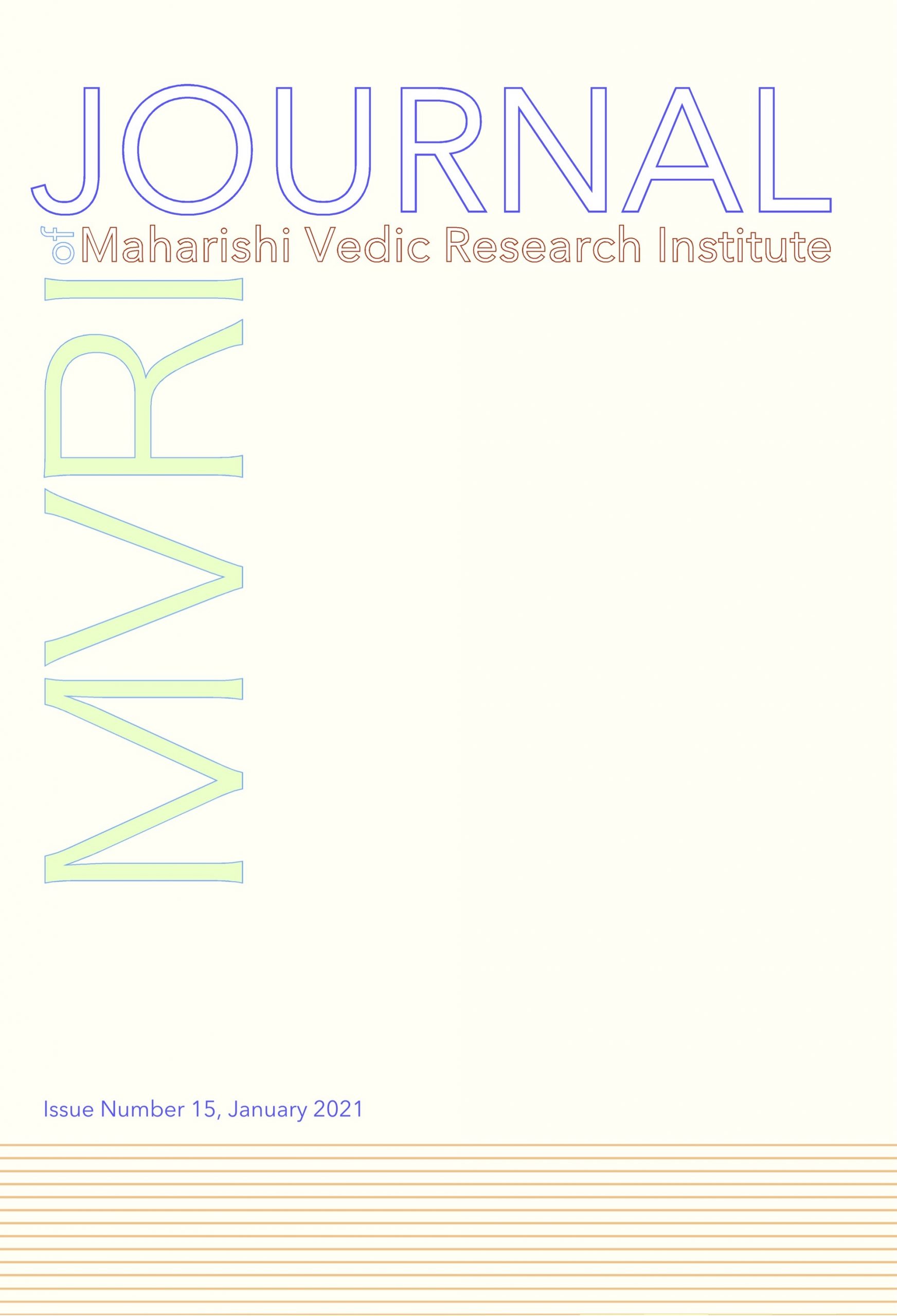 JMVRI Issue No. 15 is the third of three Special Issues which serialise a new book by Dr Geoffrey Wells, with contributions by Dr Lee Fergusson and Dr Anna Bonshek, titled “Fullness of Life: The Foundations of Maharishi’s Science of Creative Intelligence”. Issues No. 12 and No. 14 contained the first two installments of the Introduction and six chapters of the book. This Special Issue contains the following three final instalments of the book: Chapter Seven: The Seventh State of Consciousness, Unity Consciousness (pp. 13-47); Chapter Eight: Maharishi’s Science of Creative Intelligence as a Science (pp. 49-77); and Chapter Nine: The Scientific Research Program of Maharishi’s Science of Creative Intelligence (pp. 79-133).
JMVRI Issue No. 15 is the third of three Special Issues which serialise a new book by Dr Geoffrey Wells, with contributions by Dr Lee Fergusson and Dr Anna Bonshek, titled “Fullness of Life: The Foundations of Maharishi’s Science of Creative Intelligence”. Issues No. 12 and No. 14 contained the first two installments of the Introduction and six chapters of the book. This Special Issue contains the following three final instalments of the book: Chapter Seven: The Seventh State of Consciousness, Unity Consciousness (pp. 13-47); Chapter Eight: Maharishi’s Science of Creative Intelligence as a Science (pp. 49-77); and Chapter Nine: The Scientific Research Program of Maharishi’s Science of Creative Intelligence (pp. 79-133).
JMVRI Issue Number 15
JMVRI Paper 15.1
The Foundations of Maharishi’s Science of Creative Intelligence
Chapter Seven: The Seventh State of Consciousness, Unity Consciousness
Author: Geoffrey A. Wells, with Lee Fergusson and Anna Bonshek
This paper can be downloaded via the following link:
Citation: Wells, G. A., with Fergusson, L., & Bonshek, A. (2020). The foundations of Maharishi’s Science of Creative Intelligence—Chapter seven: The seventh state of consciousness, unity consciousness. Journal of Maharishi Vedic Research Institute, 15, 13-47.
Summary (excerpt):
We now come to the last step in our journey of the ‘pathless path’, described in Maharishi’s great teaching of the seven states of consciousness. In the sixth state of consciousness, as we have seen in the previous chapter, pure consciousness, the Self, continues to be lived as a permanent reality throughout all the relative states of consciousness, as it has been ever since the onset of Cosmic Consciousness. In this experience the Self has been found to be the basis of individual life.
JMVRI Paper 15.2
The Foundations of Maharishi’s Science of Creative Intelligence
Chapter Eight: Maharishi’s Science of Creative Intelligence as a Science
Author: Geoffrey A. Wells, with Lee Fergusson and Anna Bonshek
This paper can be downloaded via the following link:
Citation: Wells, G. A., with Fergusson, L., & Bonshek, A. (2020). The foundations of Maharishi’s Science of Creative Intelligence—Chapter eight: Maharishi’s Science of Creative Intelligence as a science. Journal of Maharishi Vedic Research Institute, 15, 49-77.
Summary (excerpt):
Maharishi has always presented his teaching as a science. Our approach to it has therefore been framed from the outset in scientific terms. In Chapter One we noted that all the descriptions Maharishi gives of the field of pure intelligence are validated and made meaningful by direct experience through his Transcendental Meditation and TM-Sidhi program. It is just the possibility of this experience, we concluded, that makes Maharishi’s teaching scientific; which is, in effect, to demonstrate the scientific character of the Vedic wisdom as a whole.
JMVRI Paper 15.3
The Foundations of Maharishi’s Science of Creative Intelligence
Chapter Nine: The Scientific Research Program of Maharishi’s Science of Creative Intelligence
Author: Geoffrey A. Wells, with Lee Fergusson and Anna Bonshek
This paper can be downloaded via the following link:
Citation: Wells, G. A., with Fergusson, L., & Bonshek, A. (2021). The foundations of Maharishi’s Science of Creative Intelligence—Chapter nine: The scientific research program of Maharishi’s Science of Creative Intelligence. Journal of Maharishi Vedic Research Institute, 15, 79-133.
Summary (excerpt):
In Chapter Eight, we dealt with the concept of science primarily in terms of its logic. Approaching science this way requires it to be, to some extent, idealised or simplified, abstracted from its practice. Yet science is something that people do; not just once, but as a profession, following a plan, however loosely conceived. Scientific research is thus a coherent and continuous enterprise, in which experiments are conducted not in isolation, but in an orderly relationship to each other in light of the wider domain of theory from which they arise. Science in practice is the execution of a scientific research program.

